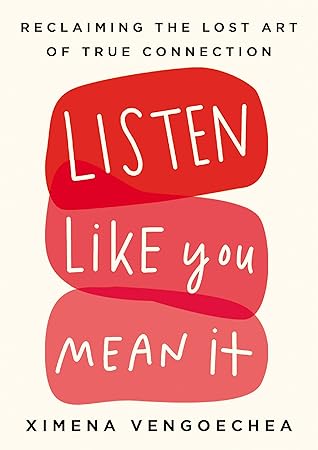More on this book
Community
Kindle Notes & Highlights
Read between
April 21, 2021 - May 19, 2022
But when we focus solely on our capabilities as speakers, we risk turning our conversation partners into an audience rather than equal collaborators. It will be hard for others to relate to us, much less put their trust in us, if that happens.
With practice, you’ll begin to notice when you may be projecting your experience onto someone else’s and learn to tame any instincts to interrupt, redirect, or appease others in conversation.
Humility does not require us to reduce our point of view to a speck of dust, but it does mean being open to being wrong, and doing the very hard work of trying to understand others’ perspectives.
Assume you are in the presence of an expert. Understand that others’ lived experience gives them unique expertise. This can help us to accept and respect their perspective, even when it is not like our own.
“Being interested is more important in cultivating a relationship and maintaining a relationship than being interesting,”
If I know I am going into a performance review or conversation about a hot button topic where I am at risk of getting defensive or emotionally charged, I will take extra care to tune in to my body both before and during the conversation.
In times when we can’t control our thoughts, we can control our body to help us return to the present.
It turns out humans can be over threshold, too: certain conditions can throw us off our game and make it harder to stay present and have the productive, empathetic conversations we seek.
To do this, we have to take what we know about ourselves—the stimuli that bring out the worst in us, as well as the conditions that keep us calm, satisfied, and on our best behavior—and design an environment that best supports our needs.
making note of how certain environments, like malls, parks, cities, and countryside, affect others’ moods the next time we hope to go deep with them.
Just as you would prepare for a long hike, if you have a lengthy meeting or marathon social event to attend, pack snacks to keep energy levels up so you can focus on your conversation partner, not your tummy.
Put another way, we naturally remember meaning better than details, and meaning, for our purposes, exists in empathy—in sensing the feelings, beliefs, and experiences of others. Luckily for us, the brain remembers emotions quite well—better than details.
So cut yourself some slack, and don’t try too hard to memorize things word for word. Instead, you can trust your human heart and intuitive memory to help you remember what’s important.
If we remember that not every thought is essential, we can free ourselves from their strong hold on our attention.


